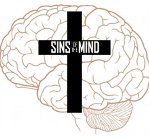Sins of the Mind is the online interactive version of the unpublished Book of Modern (Cognitive) Sins. As an instalation it featured as part of the Circus of the Mind.

After welcoming visitors to the confessional the website continues:
Father Bob Prophette’s Confessional for Modern (Cognitive) Sinners.
You are a sinner, confess your sins and receive absolution from Bob.
Noting that:
Father Bob is not a real priest. In fact he may not be a real anything. Although not a real priest, Father Bob has been trained to deal with modern sins and can therefore offer a kind of absolution. Father Bob proscribes to a doctrine. It is the Gigerenzer Creed. Gigerzener specifically acknowledges the ecological rationality of cognitive “bias”. This means you are judged on the consequences of your biased action and not on the act displaying the bias itself.
Through the confessional for cognitive sins visitors are guided through a series of ‘sin’ categories including: sins of probability or belief, decision making biases, social biases and memory biases. The confessional notes a disclaimer that it only deals with sins of a relatively mild nature. These being equivalent to the Venal Sins or Sins of the Flesh. If a sin is of a more serious nature (the cognitive equivalent of Mortal or Deadly Sins) then absolution cannot be received through the confessional.
After confessing a sin, for example The Choice Supportive Bias (where people remember their choices as better than they actually were) the visitor is asked to say Bob Prophette a random number of times (between1-10). Upon leaving the confessional visitors are presented with a tally of their sins.
The work is based on the iconography developed for the Cognitive Biases – A Visual Study Guide. Both the website, book and the installation play with the idea of cognitive bias, to get people to admit to these biases and “absolve” them of their “sins”. The idea is to poke fun at this over-hyped area of discussion which reached an apex with the success of Daniel Kahneman’s Thinking, Fast and Slow. Putting this in a sin + confession = absolution context emphasises that these so called biases should not be taken out of context. In the right context, the biases are actually very valuable short cuts to good decisions. It’s the context that matters, not the bias. This idea is associated with the work of Gerd Gigerzener, a German psychologist who was highly critical of the work of Khaneman and colleagues.